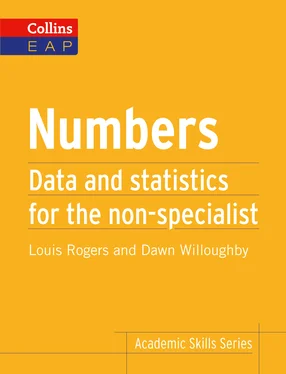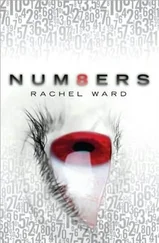avoid producing misleading results from diagrams
describe cause and effect
express generalizations and specifics
use language of argumentation
 use evaluative language
use evaluative language
 learn how to write conclusions
learn how to write conclusions
Further reading
The grammar of fractions
Glossary 
Answer key
About the Author
About the Publisher
Collins Academic Skills Series: Numbers will give you the skills you need for doing research, collecting data, presenting it, using numbers and appropriate language to describe it, and working with the collected data.
Designed to be used on a self-study basis to support English for Academic Purposes or study skills courses, it is intended for students on pre-sessional or foundation courses as well as for first-year undergraduate students.
The book has twelve chapters covering the key stages of the research process from start to finish. You will learn how to:
 choose the right research methods
choose the right research methods
use basic maths skills
present your data
analyse your data
At the back of the book there is:
 a list of useful books in Further reading
a list of useful books in Further reading
 helpful information in The grammar of fractions
helpful information in The grammar of fractions
 a Glossary of key terms
a Glossary of key terms
a comprehensive Answer key
Each chapter includes:
Aims – These set out the skills covered in the chapter.
 A self-evaluation quiz – By doing this you are able identify what you already know on the subject of the chapter and what you need to learn.
A self-evaluation quiz – By doing this you are able identify what you already know on the subject of the chapter and what you need to learn.
 Information on academic guidelines on how to develop academic skills – These sections will help you understand university practices and expectations so you know what is required.
Information on academic guidelines on how to develop academic skills – These sections will help you understand university practices and expectations so you know what is required.
 Practical exercises – These help you to develop the skills to succeed at university. You can check your answers at the back of the book.
Practical exercises – These help you to develop the skills to succeed at university. You can check your answers at the back of the book.
 Tips – Key points are highlighted for easy reference and provide useful revision summaries for the busy student.
Tips – Key points are highlighted for easy reference and provide useful revision summaries for the busy student.
 Glossary – Difficult words are glossed in boxes next to where the word appears in the chapter. There is also a comprehensive Glossary at the back of the book.
Glossary – Difficult words are glossed in boxes next to where the word appears in the chapter. There is also a comprehensive Glossary at the back of the book.
 Remember sections – This is a summary of key points for revision and easy reference.
Remember sections – This is a summary of key points for revision and easy reference.
Where we feel that a word or phrase is difficult to understand, we have glossed this word/phrase. All definitions provided in the glossary boxes have been taken from the COBUILD Advanced Dictionary . At the end of the book there is a full alphabetical list of the most difficult words from the book for your reference.
You can either work through the chapters from Chapter 1to Chapter 12or you can choose the chapters and topics that are most useful to you. The Contents page will help in your selection.
 Each chapter will take between one and three hours. Take regular breaks and do not try to study for too long. Thirty to sixty minutes is a sensible study period.
Each chapter will take between one and three hours. Take regular breaks and do not try to study for too long. Thirty to sixty minutes is a sensible study period.
 Regular study is better than occasional intensive study.
Regular study is better than occasional intensive study.
Read the chapter through first to get an overview without doing any exercises. This will help you see what you want to focus on.
Try the exercises before checking the Answer key.
 After doing the exercises in the book, try them again using your own research topic and reading materials. If possible, ask a more experienced colleague or friend to give you feedback on your work.
After doing the exercises in the book, try them again using your own research topic and reading materials. If possible, ask a more experienced colleague or friend to give you feedback on your work.
All university departments are different. Use the information in the book as a guide to investigating your own university department.
Write questions you can ask to find out how your department expects you to do research and collect and present data.
 There is no one correct way of doing research and working with collected data. Use your experience of doing the exercises to learn what works best for you. Adapt the suggestions in this book to suit your learning style and context.
There is no one correct way of doing research and working with collected data. Use your experience of doing the exercises to learn what works best for you. Adapt the suggestions in this book to suit your learning style and context.
Learning to do research and work with data is an on-going process, which means you need to practise the same skills many times. Revise regularly.
Also available in the Collins Academic Skills Series: Writing, Lectures, Research, Presenting, and Group Work .
1  Getting Started
Getting Started
Aims
look at numbers in everyday life
 understand the purpose and use of statistics
understand the purpose and use of statistics
learn key terms for working with numbers
 learn the basics about spreadsheets
learn the basics about spreadsheets
practise referring to and labelling graphics in writing
Quiz
Self-evaluation
Read the statements below. Circle the answers that are true for you.
| 1I understand what statistics is and the language to describe it. |
agree | disagree | not sure |
| 2I know a number of basic terms and phrases to describe numbers in English. |
agree | disagree | not sure |
| 3I know how to use a spreadsheet. |
agree | disagree | not sure |
| 4I know how to refer to and label graphics such as bar charts and line graphs in writing. |
agree | disagree | not sure |
Numbers and mathematics are very important in our everyday lives because we use them frequently when we manage our finances, go shopping, make travel plans, convert currency, follow instructions for a recipe or take measurements when we are building and creating things. If we carry out an academic study or investigation, then we need to use a branch of mathematics known as statistics which involves collecting and organizing data, making sense of our information and presenting findings.
Читать дальше

 use evaluative language
use evaluative language
 Getting Started
Getting Started understand the purpose and use of statistics
understand the purpose and use of statistics










